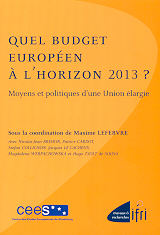Europe
Europe is described here in a geographical sense. It is not limited to the European Union, and includes, for example, the United Kingdom and the Balkans. It remains central to international relations.
Related Subjects

Opening up the G7 to South Korea to Address Contemporary Global Challenges

The G7’s global influence has diminished as powers like China reshape international governance through initiatives such as BRICS and the Shanghai Cooperation Organisation (SCO). With the G7 now representing just 10 per cent of the world’s population and 28 per cent of global GDP, its relevance is increasingly questioned.

What Budget for the EU in 2013? Means and Policies for an Enlarged Union

Quel budget européen à l'horizon 2013 ? Moyens et politiques d'une Union élargie

Politics and Policies of French Citizenship, Ethnic Minorities and the European Agenda
Space Observation for the Environment: Europe's Ambitions after the Washington Summit




Unemployment in East Asia and Europe: Report of the Council for Asia-Europe Cooperation (CAEC)
Support independent French research
Ifri, a foundation recognized as being of public utility, relies largely on private donors – companies and individuals – to guarantee its sustainability and intellectual independence. Through their funding, donors help maintain the Institute's position among the world's leading think tanks. By benefiting from an internationally recognized network and expertise, donors refine their understanding of geopolitical risk and its consequences on global politics and the economy. In 2025, Ifri supports more than 80 French and foreign companies and organizations.








